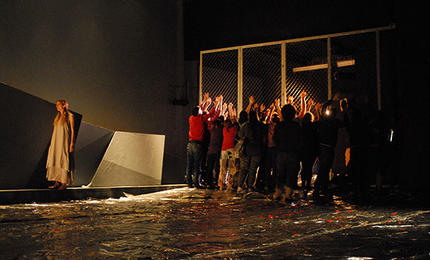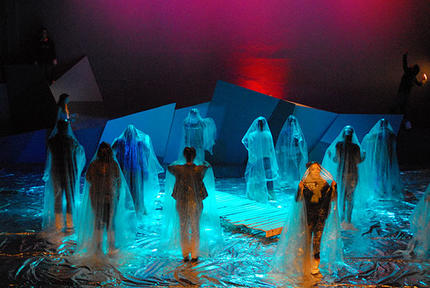Lina Abyad’s play unsettles the audience
Nom el Ghezlan uses theater to denounce the plight of the Syrian people caught between two fires: oppression and exile.

Refugees crying for help as Samira al Khalil (left) declaims the messages addressed to her and posted online by her husband.
In LAU Associate Professor and theater director Lina Abyad’s latest production Nom el Ghezlan (The Sleep of the Gazelles), the smells of zaatar, of jasmine and Aleppo soap mingle with the taste of blood and salty tears to tell the real stories of those Syrian refugees forced to leave their beloved country in search for a life, at any price. Germany is the promised land for the exiles who swim or sail away from the oppression and abortive revolution they had so strongly wished for and believed in. The courage and hopes of Walid, Carla, Ahmad and Dima, echo those of previously jailed poet Faraj Bayrakdar and writer Yassin al-Haj Saleh whose wife, long-time activist Samira el-Khalil, was kidnapped in December 2013.
“In a one-hour performance, Lina Abyad has managed to kill the idea of a featureless Syrian population, an inert group that has no dreams, no hopes – with the exception of those opponents who are jailed or kidnapped and who have their own stories,” said Syrian writer Dima Wannous during a discussion on Abyad’s production which was hosted by the Department of Communication Arts last Friday. “This play, like the revolution, has given each person a story, has restored people’s features, severely lashing out at the general lethargy – including that of the media, and the public – that surrounds this tragedy,” she added.
Poet Youssef Bazzi expressed his admiration for the artist who refuted the unacceptable status quo. “From numbers, Abyad gave refugees a name,” he said, “and this is a great act of defiance. When one defends other people’s humanity they save their own.”
Poignant and raw, the play is a human experience in its own right. To the sound of Ave Maria and verses from the Quran, it relates the suffering of individuals who face and defy the worst of men while keeping faith in humanity.
In five tableaux full of symbols, Abyad and her 23 thespians – students, alumni and non-LAU actors – transmit their attachment to a cause that has become universal and that no one should remain insensitive to.
“Nom el Ghazlan shows us how life and death have both lost value,” commented novelist and critic Elias Khoury. The LAU visiting professor explained how it transcends the sole tragedy of the Syrians to tackle the fate of millions of people across the globe who fall victim to oppression in a climate of general indifference. “Art is superior to politics in terms of its impact on people and Nom el Ghezlan is proof of that,” he added.
For Abyad, it is impossible not to expose what is happening. “My aim is to move people, to push them to get in touch with their humanity again. This is what theater is about. It is about transforming and bringing about change,” she declared.
More than that, and in Wannous’ point of view, Abyad may have been powerless to save these people, but she managed to salvage their memories and their stories.
More
Latest Stories
- Beneath the Smile: Dr. Omar Itani Reveals the Hidden Cost of Emotional Labor in Sales
- SOE Launches its Distinguished Scholar Visiting Program with International Guest Dr. Feras Batarseh
- LAU Nursing Camp Opens Eyes, Hearts and Futures
- Meet Dr. Zeina Khouri-Stevens, Executive Vice President for Health Services
- LAU Family Medicine Graduates to Benefit from a Partnership With Nova Scotia
- AKSOB Assistant Professor Shares Her Vision for the Future of Learning
- LAU Simulation Models Celebrate 20 Years of Learning, Leadership and Service
- The School of Engineering Hosts the Lebanese Electromagnetics Day




